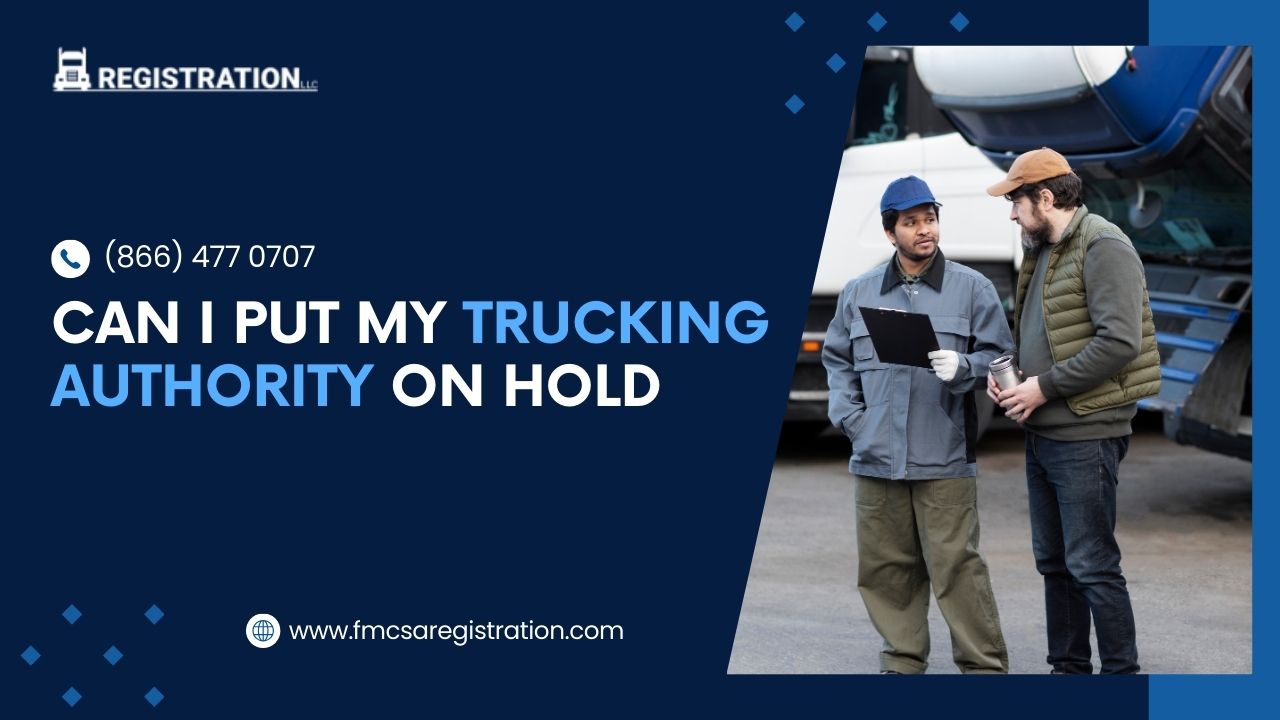Apportioned Plates
Written by Frank Balbuena Published on May 12, 2021, 7:38 p.m.
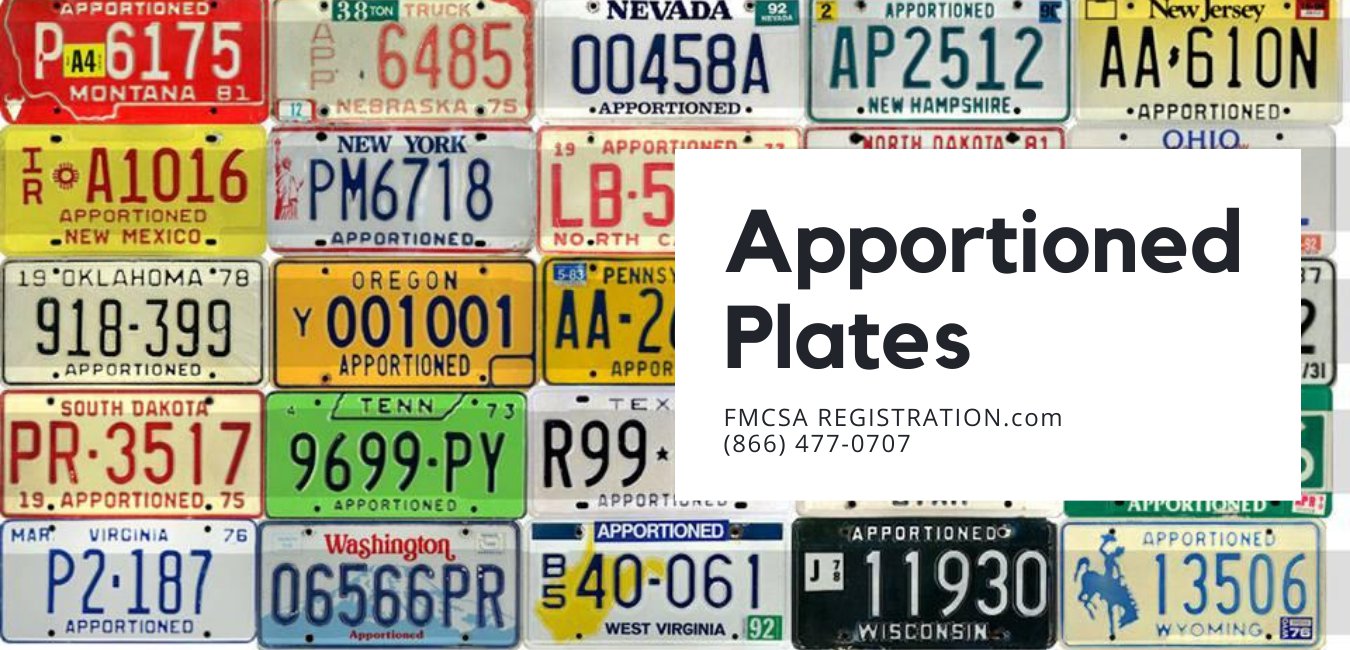
Our Organization Is Here To Help You Get Apportioned Plate
Apportioned plate are crucial to the success of almost all US motor carriers. Without having the plates, the USDOT and FMCSA can apply severe fines and penalties. One key mission of our organization is to provide carriers with the plates. This way, companies with commercial vehicles can maintain great standing with DOT regulations. If you need to secure apportioned plate, please give our trucking experts a call. Listed below is some basic information about the plates. You're welcome to contact us with questions at any time. Visit DOT Authority Package.
What Is the Purpose of Apportioned License Plates?
Apportioned license plates and apportioned registration refer to the same exact concepts. In fact, IRP (International Registration Plan) also involves apportioned plate. The plates position US commercial vehicles to operate across jurisdictions. Every state then gets a “portion” of the fees applied to vehicle registration. The apportioned fees get based on miles traveled within each state. Check out When to Update Your MCS-150.
How To Request the DOT PIN Number? Each apportioned plate functions as a license plate. A plate will be provided to a carrier. Then, the carrier can affix the plate to the commercial vehicle. The International Registration Plan (IRP) is a federal program. It functions as a vehicle registration agreement between US states. IRP rules and regulations ensure that all trucking companies use the plates. What is the DOT SAP Program? The regulation of pounds gross vehicle weight harmonizes across states and Canadian provinces, ensuring consistent standards for road safety.
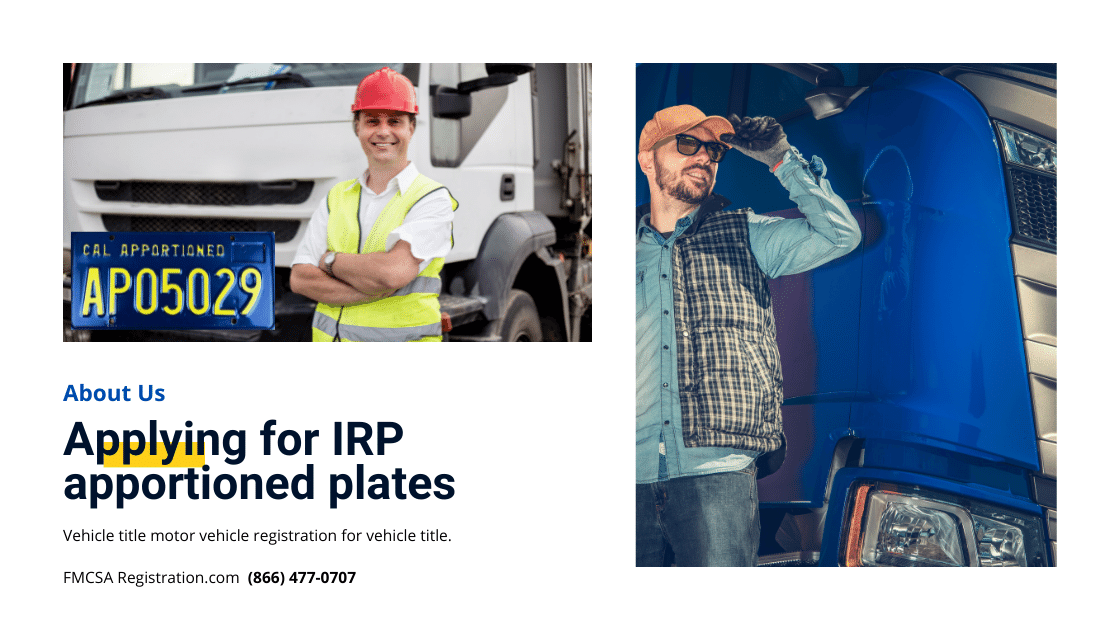
Why Does Having Apportioned Plate Help a Motor Carrier?
Say that your trucking company chooses not to use apportioned plate. That means your fleet cannot travel interstate. Your company would have to register in every single state. A carrier could receive big-time fines if a vehicle travels interstate without plates. This is an example of why apportioned registration is crucial for trucking companies. Without the plates, your business could get fined into nonexistence. Visit Dot Audit.
What Might Happen if My Trucking Company Doesn’t Use Apportioned Plate?
Expect to receive severe FMCSA and DOT fines if you don't use apportioned plate. Not using plates (and not registering in each state where you do business) leads to trouble. You could experience many $1,000 fines at once. Sometimes plate fines are even higher. This could cost your company a lot of money. That’s even more the case if you operate a large fleet. Starting a Trucking Company Correctly.
Commercial trucks must register in each correct jurisdiction. (This refers to where a motor carrier will operate.) So many carriers in the industry have failed to do so. As a result, many of those trucking companies no longer exist. That’s why our organization is passionate about supplying apportioned license plates. Once a customer has the plates, issues with the DOT and FMCSA get avoided. No matter how many trucks you have in your fleet, our team is ready to help you register. We’ll make the process simple and easy for you and all other customers. Our team can secure plates faster than any other company. Please visit the Motor Carrier Authority.
How Much Does an Apportioned Plate Cost?
Each state’s registration fee per plate will vary. The apportioned plate fee differs based on the base state where a carrier operates. But that’s not the only factor when it comes to the cost of a plate. The DOT and FMCSA also assess GVW (gross vehicle weight). The specific states where a company needs to register also affect the fee total. Here’s the standard cost of a state fee for an 80,000-pound vehicle. It’s about $1,500 to $2,000. But again, the registration fee total will vary based on your base state. Also, check out DOT Clearinghouse Enforcement.
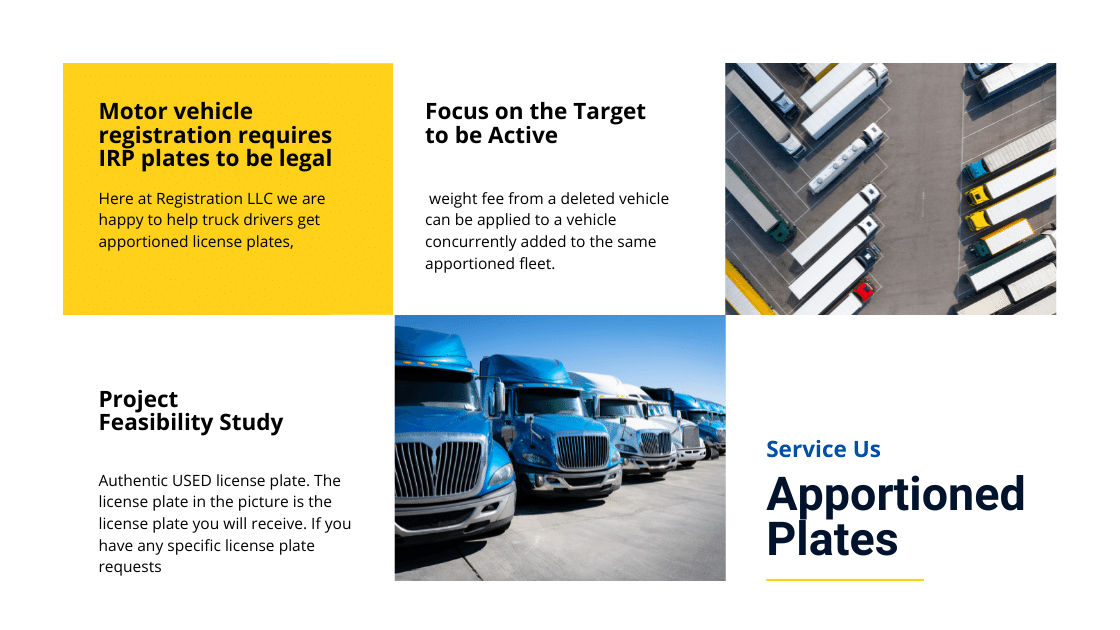
What Does Apportioned Plate Mean?
Every US state receives part of a commercial vehicle’s apportioned registration fees. The portion of the fees is based on the miles that a vehicle travels per state. Plates with apportioned status function in the same manner as license plates. The plates get issued to companies with commercial vehicles. Then, the carrier can affix a plate to a motor vehicle. Think of apportioned registration as official DOT registration for every carrier. Registration must take place in the same state where a fleet has its home base. Visit also Top 3 DOT Violations.
What Is IFTA in Trucking?
IFTA in the trucking industry refers to the International Fuel Tax Agreement. It’s an agreement that all 48 continental states in the US have. The IFTA agreement simplifies how motor carriers report fuel use. This applies to carriers with Operating Authority in at least two jurisdictions. Please contact our organization now if you need help with IFTA or fuel tax registration. Our experts can take care of your IFTA-related needs today. Check out how to prepare for DOT Week 2021.
What Does IRP Mean?
IRP refers to the International Registration Plan that the DOT and FMCSA adhere to. The plan functions as an agreement related to apportioned registration. Almost all commercial motor vehicles have to take part in apportioned registration. They register for IRP based on the number of miles traveled within a jurisdiction. Know about MC Number Insurance Requirements .
The IRP plan functions as a crucial commercial vehicle registration. Without IRP registration , interstate operation almost always cannot take place. Through IRP, an interstate vehicle can use a single registration plate. The driver of the vehicle will also receive a cab card (registration certificate). That certificate gets issued through the base state of each carrier.

The Basics of Apportioned Registration & Plates
Apportioned registration and apportioned plate both refer to the terms of IRP. The International Registration Plan functions as an official registration cooperation agreement. That agreement takes place between all 48 contiguous states in the United States. (And also within the provinces of Canada.) Through IRP, carriers provide payment of registration fees based on miles traveled. The total of the miles gets separated based on every jurisdiction in the program. So, what’s the main purpose of IRP and plates with apportioned status? It’s to ensure the DOT and FMCSA can track carriers using the US highway system.
The American Association of Motor Vehicles Administrators (AAMVA) created IRP. The purpose was to promote US interstate vehicle operations and commerce. How so? Through authorizing vehicle registration for commercial interstate travel. Through IRP, carriers can take care of interstate vehicle operations with ease. Keep in mind that a carrier or power unit needs one license plate. The plate gets marked as “APP,” “ARP,” or “Apportioned.” This refers to registration in a base state, home state, or jurisdiction of a trucking company. A plate and cab card gets applied to each vehicle in a commercial interstate fleet. How To Pass Dot Drug Test ?
It’s crucial that a carrier affix an apportioned license plate to every vehicle. This way, a company can prove it has complete DOT and FMCSA authority. Apportioned plate show that every jurisdiction receives part of the registration fees. This takes place through the IRP plan. The IRP apportioned process happens no matter which state provides a license place. Every cab card displays which states a carrier can travel through. A cab card also features permitted weight limit information of a vehicle. Know about the The Basics of Farm Exemptions .
Which Vehicles Must Use Apportioned Plate & Follow IRP (the International
Registration Plan)?
Plates with apportioned status/IRP rules apply to almost all commercial interstate vehicles. A vehicle must have the purpose of interstate use across more than one jurisdiction. That is the key basis of IRP (the International Registration Plan). The power unit of a vehicle must have at least two axles. The GVW (gross vehicle weight) has to exceed 10,000 pounds. This gross vehicle weight applies when used in combination with hauling goods.
How IRP (the International Registration Plan) Functions
Does your carrier or company use a commercial vehicle in more than two states? If so, it will save you a lot of money to take care of registration fees through IRP. Say that you decide to register your commercial vehicle with IRP today. You will pay apportioned (prorated) fees. The apportioned fee total gets based on a percentage of total highway miles. The number of miles get separated per each jurisdiction. Once you pay the fee, you can receive plates with apportioned status.
Here is an example of how IRP and apportioned plate function. Say that an interstate vehicle operates 50 percent of total mileage in Texas. The other 50 percent of total mileage takes place in New Mexico. The vehicle gets assessed with 50 percent of IRP registration fees per state. This replaces the concept of paying a full registration fee amount in every state. IRP registration fees get processed through the IRP Clearinghouse. This takes place within the base jurisdiction of a carrier. The fees apply to all jurisdictions where an interstate motor vehicle is operating. How to get TEXAS Dot number?
Why Should I Let FMCSA Registration LLC Set Up my IRP & IFTA Accounts?
Filling out IFTA and IRP applications is a very complicated, confusing process. Sometimes it takes carriers countless hours to complete the applications. That’s why so many interstate trucking companies turn to FMCSA Registration LLC . Our experts set up thousands of IRP and IFTA accounts each year. We complete every application while avoiding application errors. Having one error on your IFTA or IRP application could result in big-time delays.
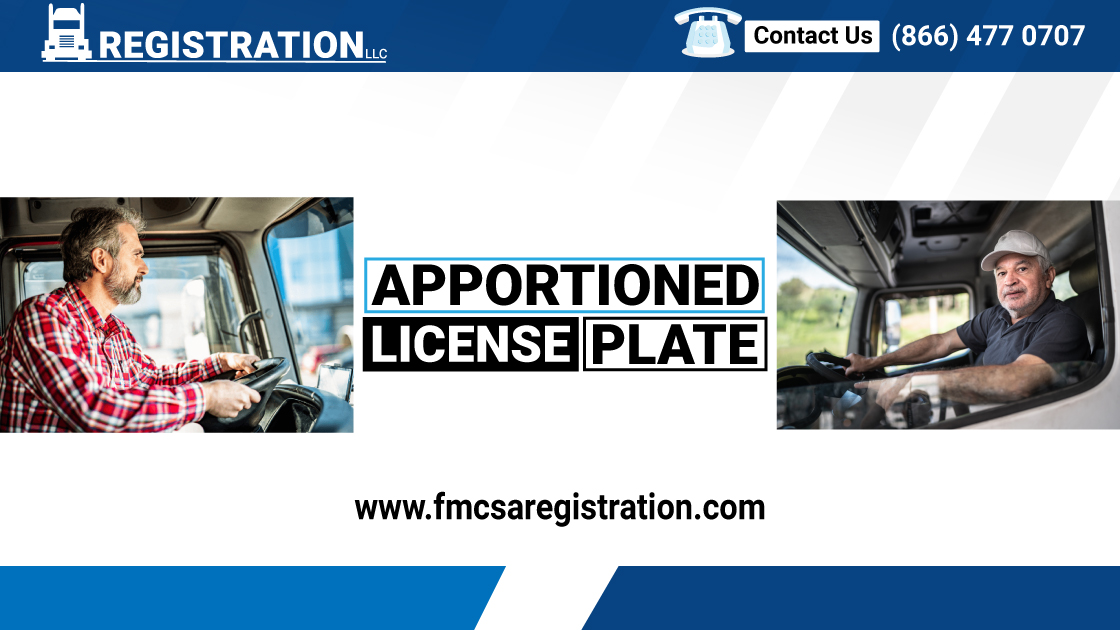
Trucking companies can't wait months for plates with apportioned status to arrive. They need their plates ASAP. And our registration experts understand this. That’s why we go the extra mile to make sure carriers have all supporting documents in place. Every individual state demands that a new account has to get set up. Our team can create accounts on your behalf and conduct an audit on your application. This way, we can ensure that each state has the right registration documents. Check out Trucking Operating Packages .
What Does My Company Receive Once IRP & IFTA Accounts Get Set Up?
Through IRP registration, your company will receive an apportioned license plate. The apportioned plate goes onto the power unit of your commercial vehicle. Your business will also receive an Apportioned Cab Card. The cab card lists the states where your vehicle has active IRP registration. Then, your interstate truck drivers can start operating vehicles in those states. Through IFTA registration, your carrier will receive a set of IFTA stickers (decals). The IFTA stickers must get applied to the power unit of each vehicle. You will also receive an IFTA license. The license has to get kept inside the cab of every commercial interstate vehicle.
Contact Us Now if You Need Plates With Apportioned Status or Other Trucking Permits
Our experts are standing by to supply your carrier with apportioned plate ASAP. But FMCSA Registration LLC can do more than get you plates with apportioned status. We take care of every single DOT and FMCSA trucking permit. From an MC Number to DOT Number to BOC-3 process agent documents. There’s no limit to what our services can do to keep your company in compliance. This way, your drivers can continue to move loads with complete Operating Authority. Also, feel free to call us with any questions about IFTA fuel tax policies and IRP. We’re ready to help your trucking company succeed today. What is The FMSCA 30-Minute Break Rule.
Are Any Vehicles Exempt From the IRP Apportioned Registration Requirements?
In certain cases, there are vehicles with IRP apportioned registration exemptions. But most carriers in commercial trucking must take part in apportioned registration. Say that your vehicle weighs less than 26,000 pounds. Plus, you're only operating as an interstate driver. This means that you could receive an IRP exemption. Plus, your carrier could also secure a temporary commercial trip permit exemption.
Remember to always contact the state or jurisdiction that you're traveling toward. This way, you will know for certain if you have to file for IRP. We recommend that you do so no matter how much your vehicle weighs. Also, you can have our organization contact state authorities on your behalf. Please give us a call about getting an IRP apportioned plate exemption. Our team’s prepared to send you more IRP information. This way, your carrier can adhere to all those DOT and FMCSA policies.
What Documents Are Required for IRP Registration?
Let’s now go over the documents that you must file for IRP registration. The exact documents will vary based on your state and carrier status. So, let’s use IRP registration in California as an example for those who need help. Here are the standard IRP documents that a carrier must file. First, you have to file the California IRP Carrier Data Schedule A/B (MC 2117 I). This filing must include a California Vehicle Data Schedule C (MC 2118 I) filing. You will also need to provide the state with a USDOT number. The number is for the person that plans on operating the vehicle.
When it comes to IRP registration, a carrier must have updated its MCS-150. That update needs to have taken place within the last year. An MCS-150 refers to the Federal Motor Carrier Identification Report. In most cases, a state will also need your Taxpayer ID Number. Or, an SSN (social security number). Most jurisdictions will also accept a Federal Employer Identification Number (FEIN). Once again, let’s use the state of California as an example of apportioned plate registration. The state will ask for documentation that proves the address of your business. Then, you must provide a California driver license number.
Many states will also ask a carrier to file an MC 522 I. This filing refers to the IRP “Agreement to Prepare and Maintain Records” document. Some states will also ask for proof of Federal Heavy Vehicle Use Tax payment. Next, you must provide the state with a verification of your VIN. This stands for the “vehicle identification number.” All the information above will get sent to the Department of Motor Vehicles. Let our organ if you need us to send the DMV your IRP documents.
Keep in mind that standard IRP registration lasts twelve months. Registration goes into effect on the first day of your carrier’s assigned month. IRP fleets and vehicles must get renewed on an annual basis. The deadline is midnight of the final day of the month within a registration period. Otherwise, your trucking business could experience fines and penalties. Please let our company know if you need more information about IRP documents. We’re standing by to send you a PDF guide about IRP registration.
What Is a Base Jurisdiction?
Here is the definition of a “base jurisdiction.” It is the specific jurisdiction where an applicant has his or her own business. Per the FMCSA, every base jurisdiction has to function as a physical location. Mileage will get accrued by a fleet or those within each base jurisdiction. A base jurisdiction is also where operational records of a fleet get maintained.
How Long Is the DOT SAP Program?
The US Department of Transportation enforces the SAP to maintain the following schedule. The SAP has to schedule at least six tests within a twelve month time frame. But keep in mind that the process can last up to five years. In fact, this process functions much like an RTD test. Every SAP follow-up test must get taken through direct observation. This is an official DOT policy. Do you need to find out more information about the DOT SAP Program? If so, please contact our organization. We’re standing by to send those who need information a PDF guide about the program.
